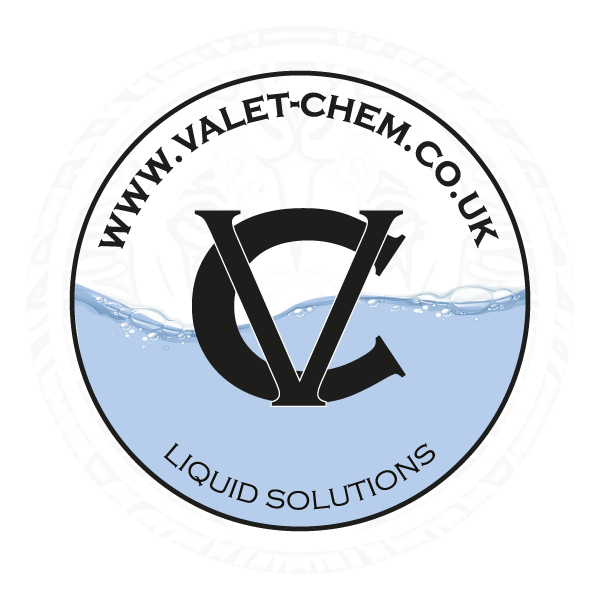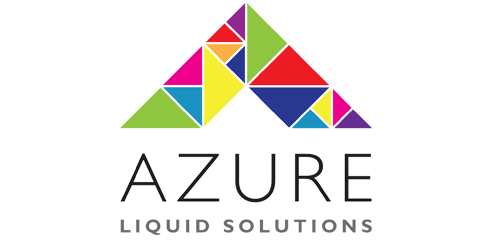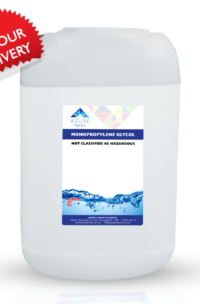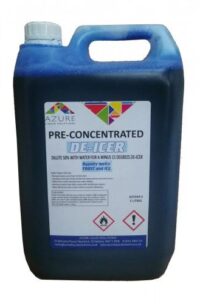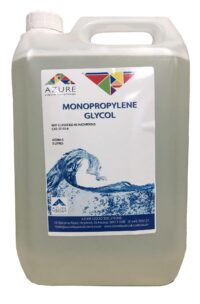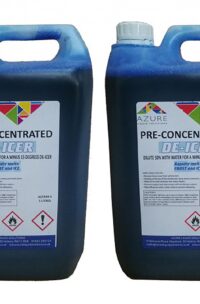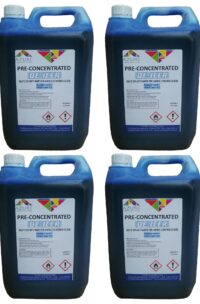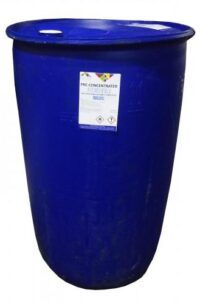De-Icers
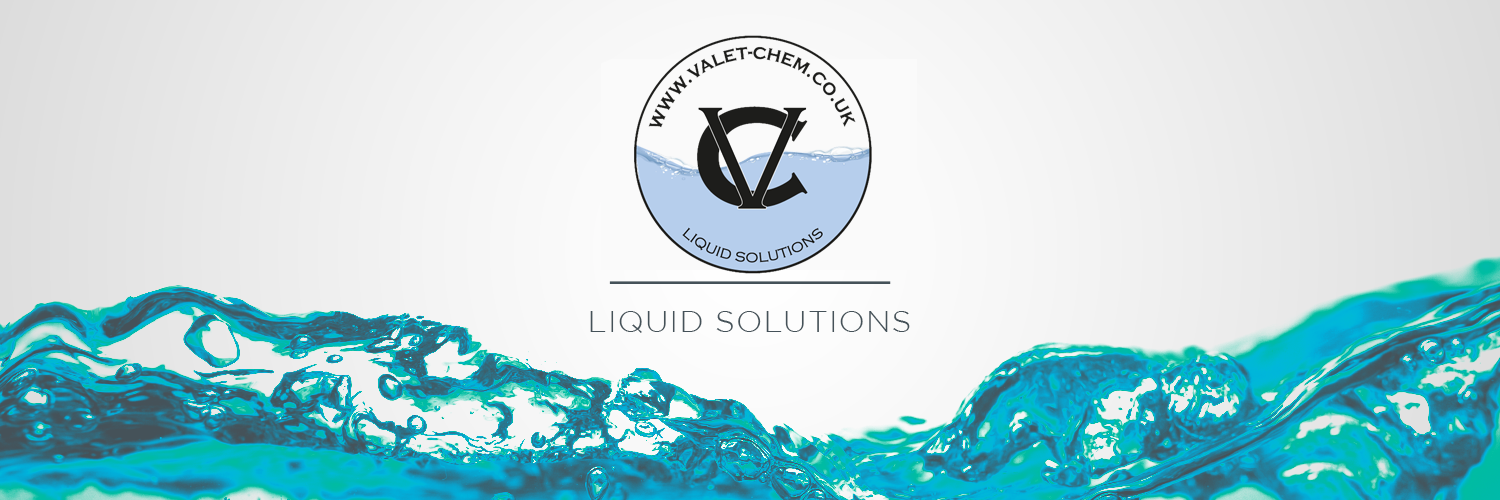
- You cannot add "Azure Pre-Concentrated De-Icer Winter Rapidly Melts Frost & Ice - 5L x 2" to the basket because the product is out of stock.
-
Antifreeze
Monopropylene Glycol Organic Compound Antifreeze Aircraft De-Icing Fluid – 25L
£159.00 inc. VATMonopropylene Glycol Organic Compound Antifreeze Aircraft De-Icing Fluid – 25L
Propylene glycol is an organic compound with the chemical formula
CH3CH(OH)CH2OH. It is a viscous, colorless liquid, which is nearly
odorless but possesses a faintly sweet taste. Containing two alcohol
groups, it is classed as a diol. It is miscible with a broad range of
solvents, including water, acetone, and chloroform. In general,
glycols are non-irritating, have very low volatility and very low
toxicity.
Propylene glycol is commonly used to de-ice aircraft
Antifreeze
The freezing point of water is depressed when mixed with propylene
glycol. It is used as aircraft de-icing fluid. Water-propylene glycol
mixtures dyed pink to indicate the mixture is relatively nontoxic are
sold under the name of RV or marine antifreeze. Propylene glycol is
frequently used as a substitute for ethylene glycol in low toxicity,
environmentally friendly automotive antifreeze. It is also used to
winterize the plumbing systems in vacant structures. The eutectic
composition/temperature is 60:40 propylene glycol:water/-60 °C.
The −50 °F/−45 °C commercial product is, however, water rich; a
typical formulation is 40:60.
Polymers
Forty-five percent of propylene glycol produced is used as chemical
feedstock for the production of unsaturated polyester resins. In this
regard, propylene glycol reacts with a mixture of unsaturated maleic
anhydride and isophthalic acid to give a copolymer. This partially
unsaturated polymer undergoes further crosslinking to yield
thermoset plastics. Related to this application, propylene glycol
reacts with propylene oxide to give oligomers and polymers that are
used to produce polyurethanes. Propylene glycol is used in
waterbased acrylic architectural paints to extend dry time which it
accomplishes by preventing the surface from drying due to its slower
evaporation rate compared to water.
Food
Propylene glycol is also used in various edible items such as coffee
based drinks, liquid sweeteners, ice cream, whipped dairy products
and soda. Vaporizers used for delivery of pharmaceuticals or
personal-care products often include propylene glycol among the
ingredients.In alcohol-based hand sanitizers, it is used as a
humectant to prevent the skin from drying. Propylene glycol is used
as a solvent in many pharmaceuticals, including oral, injectable, and
topical formulations. Many pharmaceutical drugs which are insoluble
in water utilize PG as a solvent and carrier; benzodiazepine tablets
are one example.PG is also used as a solvent and carrier for many
pharmaceutical capsule preparations. Additionally, certain
formulations of artificial tears use proplyene glycol as an ingredient.
-
Antifreeze
Monopropylene Glycol Organic Compound Antifreeze Aircraft De-Icing Fluid – 210L
£1,499.00 inc. VATMonopropylene Glycol Organic Compound Antifreeze Aircraft De-Icing Fluid – 210L
Propylene glycol is an organic compound with the chemical formula
CH3CH(OH)CH2OH. It is a viscous, colorless liquid, which is nearly
odorless but possesses a faintly sweet taste. Containing two alcohol
groups, it is classed as a diol. It is miscible with a broad range of
solvents, including water, acetone, and chloroform. In general,
glycols are non-irritating, have very low volatility and very low
toxicity.
Propylene glycol is commonly used to de-ice aircraft
Antifreeze
The freezing point of water is depressed when mixed with propylene
glycol. It is used as aircraft de-icing fluid. Water-propylene glycol
mixtures dyed pink to indicate the mixture is relatively nontoxic are
sold under the name of RV or marine antifreeze. Propylene glycol is
frequently used as a substitute for ethylene glycol in low toxicity,
environmentally friendly automotive antifreeze. It is also used to
winterize the plumbing systems in vacant structures. The eutectic
composition/temperature is 60:40 propylene glycol:water/-60 °C.
The −50 °F/−45 °C commercial product is, however, water rich; a
typical formulation is 40:60.
Polymers
Forty-five percent of propylene glycol produced is used as chemical
feedstock for the production of unsaturated polyester resins. In this
regard, propylene glycol reacts with a mixture of unsaturated maleic
anhydride and isophthalic acid to give a copolymer. This partially
unsaturated polymer undergoes further crosslinking to yield
thermoset plastics. Related to this application, propylene glycol
reacts with propylene oxide to give oligomers and polymers that are
used to produce polyurethanes. Propylene glycol is used in
waterbased acrylic architectural paints to extend dry time which it
accomplishes by preventing the surface from drying due to its slower
evaporation rate compared to water.
Food
Propylene glycol is also used in various edible items such as coffee
based drinks, liquid sweeteners, ice cream, whipped dairy products
and soda. Vaporizers used for delivery of pharmaceuticals or
personal-care products often include propylene glycol among the
ingredients.In alcohol-based hand sanitizers, it is used as a
humectant to prevent the skin from drying. Propylene glycol is used
as a solvent in many pharmaceuticals, including oral, injectable, and
topical formulations. Many pharmaceutical drugs which are insoluble
in water utilize PG as a solvent and carrier; benzodiazepine tablets
are one example.PG is also used as a solvent and carrier for many
pharmaceutical capsule preparations. Additionally, certain
formulations of artificial tears use proplyene glycol as an ingredient.
-
Automotive/Engineering
Azure Pre-Concentrated De-Icer Winter Rapidly Melts Frost & Ice – 5L
£26.99 inc. VATAzure Pre-Concentrated De-Icer Winter Rapidly Melts Frost & Ice – 5L
- Pre-Concentrated
- Dilute 50% with water for a minus 15 degrees de-icer
- RAPIDLY MELTS FROST AND ICE.
FREE DELIVERY ON ALL UK PURCHASES
-
Antifreeze
Monopropylene Glycol Organic Compound Antifreeze Aircraft De-Icing Fluid – 5L
£39.99 inc. VATMonopropylene Glycol Organic Compound Antifreeze Aircraft De-Icing Fluid – 5L
Propylene glycol is an organic compound with the chemical formula
CH3CH(OH)CH2OH. It is a viscous, colorless liquid, which is nearly
odorless but possesses a faintly sweet taste. Containing two alcohol
groups, it is classed as a diol. It is miscible with a broad range of
solvents, including water, acetone, and chloroform. In general,
glycols are non-irritating, have very low volatility and very low
toxicity.
Propylene glycol is commonly used to de-ice aircraft
Antifreeze
The freezing point of water is depressed when mixed with propylene
glycol. It is used as aircraft de-icing fluid. Water-propylene glycol
mixtures dyed pink to indicate the mixture is relatively nontoxic are
sold under the name of RV or marine antifreeze. Propylene glycol is
frequently used as a substitute for ethylene glycol in low toxicity,
environmentally friendly automotive antifreeze. It is also used to
winterize the plumbing systems in vacant structures. The eutectic
composition/temperature is 60:40 propylene glycol:water/-60 °C.
The −50 °F/−45 °C commercial product is, however, water rich; a
typical formulation is 40:60.
Polymers
Forty-five percent of propylene glycol produced is used as chemical
feedstock for the production of unsaturated polyester resins. In this
regard, propylene glycol reacts with a mixture of unsaturated maleic
anhydride and isophthalic acid to give a copolymer. This partially
unsaturated polymer undergoes further crosslinking to yield
thermoset plastics. Related to this application, propylene glycol
reacts with propylene oxide to give oligomers and polymers that are
used to produce polyurethanes. Propylene glycol is used in
waterbased acrylic architectural paints to extend dry time which it
accomplishes by preventing the surface from drying due to its slower
evaporation rate compared to water.
Food
Propylene glycol is also used in various edible items such as coffee
based drinks, liquid sweeteners, ice cream, whipped dairy products
and soda. Vaporizers used for delivery of pharmaceuticals or
personal-care products often include propylene glycol among the
ingredients.In alcohol-based hand sanitizers, it is used as a
humectant to prevent the skin from drying. Propylene glycol is used
as a solvent in many pharmaceuticals, including oral, injectable, and
topical formulations. Many pharmaceutical drugs which are insoluble
in water utilize PG as a solvent and carrier; benzodiazepine tablets
are one example.PG is also used as a solvent and carrier for many
pharmaceutical capsule preparations. Additionally, certain
formulations of artificial tears use proplyene glycol as an ingredient.
-
Automotive/Engineering
Azure Pre-Concentrated De-Icer Winter Rapidly Melts Frost & Ice – 5L x 2
£39.99 inc. VATAzure Pre-Concentrated De-Icer Winter Rapidly Melts Frost & Ice – 5L x 2
- Pre-Concentrated
- Dilute 50% with water for a minus 15 degrees de-icer
- RAPIDLY MELTS FROST AND ICE.
-
Automotive/Engineering
Azure Pre-Concentrated De-Icer Winter Rapidly Melts Frost & Ice – 25L
£129.99 inc. VATAzure Pre-Concentrated De-Icer Winter Rapidly Melts Frost & Ice – 25L
- Pre-Concentrated
- Dilute 50% with water for a minus 15 degrees de-icer
- RAPIDLY MELTS FROST AND ICE.
Directions for use:
- Remove loose snow from the windscreen
- Starting at the top of the windscreen sprat across and work down
- Allow the ice to melt and then free wiper blades
- Remove surplus and clear screen with windscreen wipers
- Wipe off excess with a clean cloth to prevent refreezing.
-
Automotive/Engineering
Azure Pre-Concentrated De-Icer Winter Rapidly Melts Frost & Ice – 5L x 4
£69.99 inc. VATAzure Pre-Concentrated De-Icer Winter Rapidly Melts Frost & Ice – 5L x 4
- Pre-Concentrated
- Dilute 50% with water for a minus 15 degrees de-icer
- RAPIDLY MELTS FROST AND ICE.
-
Automotive/Engineering
De-Icer Winter Rapidly Melts Frost & Ice Preforms down to -15C Spray – 750ml
£15.99 inc. VATOdessa De-Icer Winter Rapidly Melts Frost & Ice Preforms down to -15C
Trigger Spray – 750ML
Directions for use:
- Remove loose snow from the windscreen
- Starting at the top of the windscreen sprat across and work down
- Allow the ice to melt and then free wiper blades
- Remove surplus and clear screen with windscreen wipers
-
Automotive/Engineering
Azure Pre-Concentrated De-Icer Winter Rapidly Melts Frost & Ice – 210L
£1,000.00 inc. VATPre-Concentrated
Dilute 50% with water for a minus 15 degrees de-icer
RAPIDLY MELTS FROST AND ICE.
